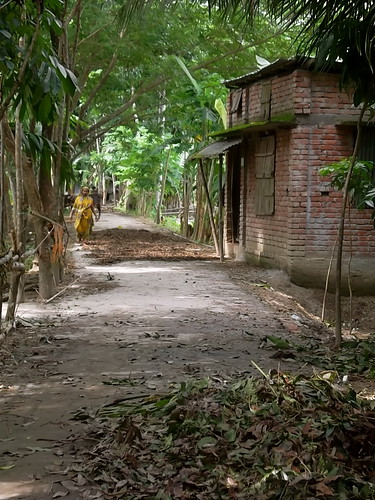In the past weeks I have been planning and getting ready to head to Barisal. I have found most things to move a day or two behind schedule regardless of how I attempt to stick to it. Its inevitable for the power to go out before I need to print something for a meeting, rain pours and rickshaws stop, or I unexpectedly spend 4 hours on a buss in Dhaka traffic.
When I got off of the ferry in Barisal it was 4:30 in the morning. My rickshaw driver couldn’t understand the directions I was attempting to provide him with. I told him to sit in the back with my bags and I peddled the rickshaw to the BERDO office. I had been here a couple of weeks before and remembered the way. Kind of like a horse smells the barn, Adam smelled the BERDO office.
In the first couple of hours I interview some translators. Two of them met to compete for what probably is the most highly paying student job in Barisal. Mahamud’s English isn’t that good but I hired him anyway since there were no other options. He continues to hit me up for more money even though I pay him double the amount of the average local salary. He works hard so I normally treat him to lunch, transportation, and tea. He’s my age and is studying zoology. He got the job over the guy studying English.
After a number of cups of tea with Alamgir, the Operations Manager of BERDO’s Barisal office, and Mahamud, we all left to meet with a group of stakeholders. My average stakeholder meeting consists of me and 14 other people nestled into a 6 by 8 tin shack, all eyes on me.
How funding from BERDO works:
BERDO applies for funding for, let’s say, 50 thousand dollars and takes on the responsibility of the loan. Then after the loan has been awarded to BERDO it’s broken up between the different locations. Barisal is one of the three locations. Once the money makes it to one of the three locations its up to that office to find the borrowers. Potential borrowers hear about the possibility of receiving a loan and come to the office to get signed up with BERDO. BERDO then catalogs all of the individuals interested in loans, organizes them by geographic location, and puts them into groups of anywhere from 8 to 22 individuals. Each group has its own “group officer” who’s volunteered for that specific position. Their role is to collect all of the member’s payments and submit it in one lump sum when Alamgir shows up to collect the payments.
There are 37 groups BERDO lends to in Barisal and 409 individuals receiving loans. Loaning to groups makes sense for a number of reasons. One obvious reason is that it gets complicated and too time consuming to loan such small amounts to so many individuals. It’s easier to loan 2000 dollars to a group of 20 than it is to make 20 loans of 100 dollars. By lending to a group BERDO is also protecting itself from borrowers defaulting. The groups are treated how an individual borrower would be treated. If an individual in the group can’t make a payment it’s in the best interest of the group to make the payment for the Individual. If they don’t make up for the individual who couldn’t pay, it jeopardizes the entire group’s (and all the individuals in it) ability to get a loan in the future. Much like a loan in the states, a good credit history enhances your chances of getting loans in the future.
I was a bit surprised to find out that most women–almost all of the women– hadn’t used the loans for themselves. (There are a couple of exceptions.) They had either been pressured by their husbands to get a loan or didn’t think they had the skill to use the loan effectively and offered it to their husbands. I asked why they felt like they couldn’t handle the loans themselves and the response was that they were just too nervous and unsure about their ability. It’s hard for men to receive loans as most of the focus has been given to giving them to women. When their husbands are doing well, however, wives benefit too, and after seeing their husbands’ successes and increased self-confidence some have asked me if it’s possible for me to get themloans. That made me very happy. Most of the women want to start tailor shops, restaurants, and other “female works” and become “independent”. I’m excited about helping that process and will spend the next month working with Alamgir on how to get that going.
BERDO’s lending at the moment is going very well and doesn’t have anyone who’s unable to pay out of the 37 groups. The problem is that the demand is greater than BERDO’s lending budget. Every group I have meet with thus far has asked for more opportunities to borrow from BERDO, to increase the size of their businesses, fields, number of employees, etc. The opportunity to grow is there. They are just asking for a little jump-start to get them off the ground. The living conditions, culture, religion, and a number of other things about life here are quite different from the United States. The dream of self-sufficiency and pride in accomplishment is the same and provides the same effects on self-esteem as it does anywhere else in the world.
Posted By Adam Kruse
Posted Jul 15th, 2012




